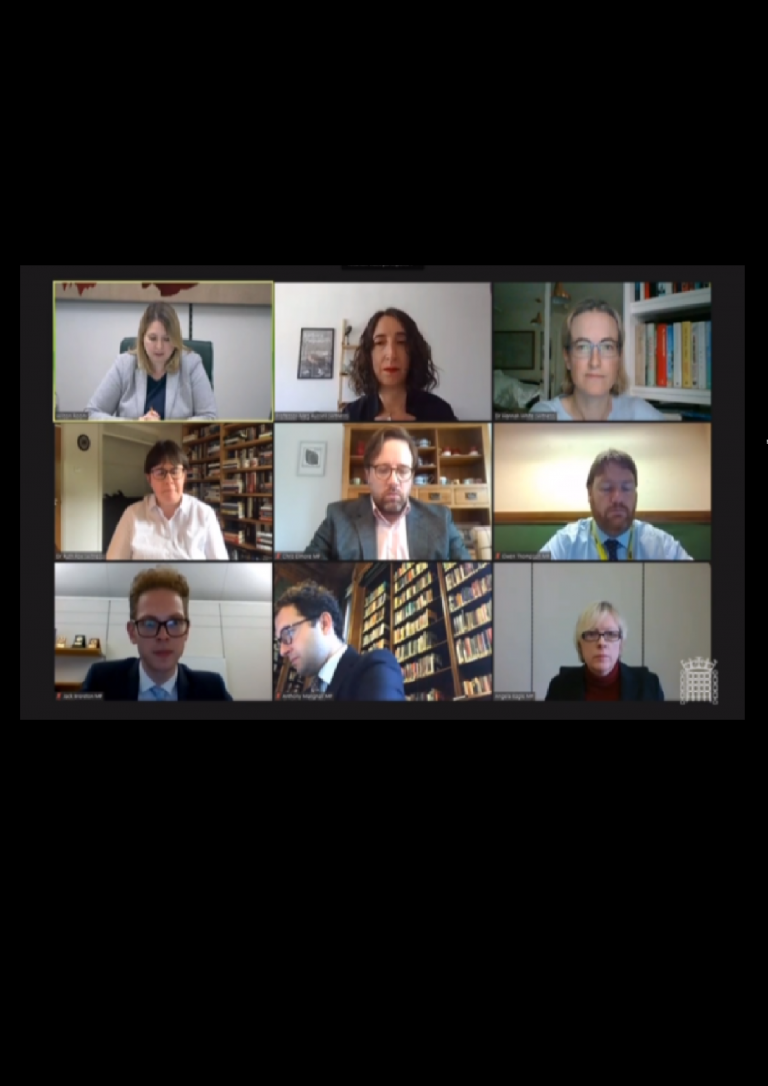Unit Director Meg Russell gives evidence to Commons Procedure Committee
9 July 2020
Professor Meg Russell gave evidence to the House of Commons Procedure Committee on 8 July as part of its inquiry into ‘procedure under coronavirus restrictions’.

Professor Russell gave evidence about House of Commons procedure during the pandemic, alongside Dr Hannah White of the Institute for Government and Dr Ruth Fox of the Hansard Society.
Key points from Meg Russell’s evidence included the following:
- The House of Commons was a world leader in its early response to the pandemic. That response – aided by outstanding work from staff, the Speaker, senior politicians and the Procedure Committee alike – was marked by two things. The first was the consensual, cross-party nature of the decision-making. The second was the inclusivity of the procedural solutions the House adopted, which allowed all members to continue participating – something achieved by relatively few other parliaments at the time. However, the decision-making process in the Commons became steadily less consensual and more government-dominated as time went on. This was deeply regrettable – and led in turn to a terrible breach of the principle of inclusivity, when many MPs were unable to participate in the 2 June vote on ending the hybrid Commons, and have had unequal access to other proceedings ever since. The crisis has vividly demonstrated how far the government controls the House of Commons agenda, and how problematic that is.
- The Commons’ immediate focus during the pandemic was on transferring its existing procedures to the hybrid model. But – as Meg and Ruth Fox argued in an April blog post – the pandemic presented opportunities to pursue procedural innovation which would have allowed parliament to hold the government more effectively to account. Reform, for example, of the Urgent Question system, and more regular appearances by the Prime Minister in front of the Liaison Committee, might have allowed parliamentarians to scrutinise key government decisions in a more timely way – bringing some of the scrutiny which was occurring at the Downing Street press conferences inside parliament.
- Major policy changes to handle the pandemic have been announced and introduced through secondary legislation, and have come into force without parliament being given the chance to scrutinise them – even when those changes have been mooted weeks in advance and have clearly been contentious.
- The government’s agenda control has meant that it ultimately held the initiative on procedural change. This was particularly evident prior to the Whitsun recess, when the government allowed the temporary orders governing the hybrid Commons to lapse, and the Commons could not act to prevent this.
- The government seems to have acted as if its partisan majority in the House automatically implied a majority for its preferred procedural decisions. But – as in the case of the backbench rebellion and government defeat on the question of how the Commons would deal with bullying cases – that cannot be taken for granted. It is by no means clear that there was actually a majority in favour of ending the hybrid Commons on 2 June. Professor Russell suggested that, while formally a decision of the House of Commons, the exclusion of a significant number of MPs from that vote made it 'invalid and illegitimate'. The House of Commons has an independent existence from the government – indeed the government only is the government on the basis of its support in the House of Commons. The chamber should therefore be free to take decisions on its own functioning.
- The 2009 Wright Committee recognised that a central problem was the extent of government control over the Commons agenda, and recommended a system which would have given MPs themselves far greater control. In terms of next steps, as well as considering questions about which procedures adopted during the crisis may be worth retaining longer term, the Procedure Committee could perhaps usefully turn its attention to these broad questions of government versus parliamentary control.
Evidence in full:
Key links:
- Procedure under coronavirus restrictions inquiry
- Meg Russell and Ruth Fox’s ‘Proposals for a virtual parliament’, on the Unit blog
- An open letter to Leader of the House Jacob Rees-Mogg about the ending of the hybrid Commons, from a group of democracy experts including Meg Russell and Ruth Fox
- The Unit’s blog posts on parliament and coronavirus
- The Unit’s research on parliament
 Close
Close

